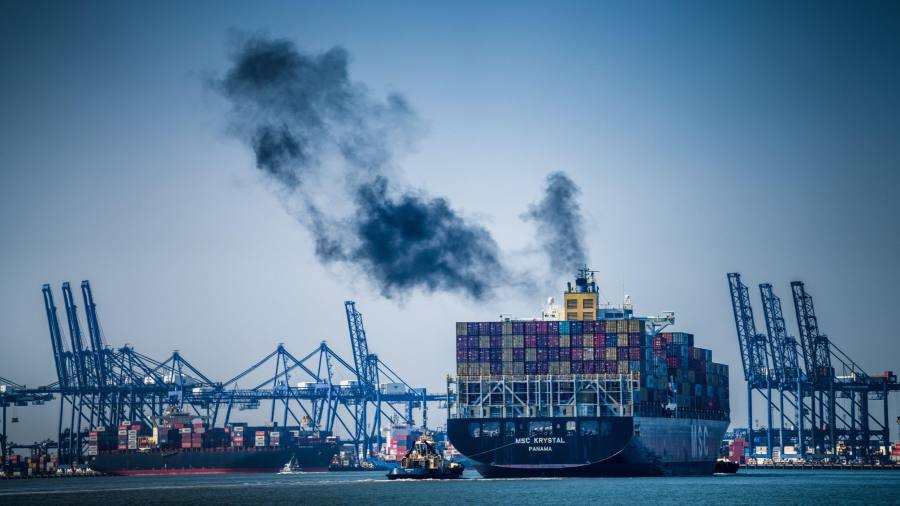Receive free Shipping updates
We’ll send you a myFT Daily Digest email rounding up the latest Shipping news every morning.
China has urged poorer countries to oppose a levy on shipping emissions and stronger targets for decarbonising one of the world’s most polluting industries, criticising wealthy nations for setting “unrealistic” goals with “significant” financial costs.
Beijing distributed a “diplomatic note” to developing nations as they prepared for a critical meeting at the UN’s International Maritime Organization in July, according to four people present at IMO discussions. The lobbying effort comes days after France rallied 22 allies behind a shipping emissions levy.
China warned that “an overly ambitious emission reduction target will seriously impede the sustainable development of international shipping, significantly increase the cost of the supply chain and will adversely impede the recovery of the global economy”, according to a document seen by the Financial Times.
It added: “Developed countries are pushing the IMO to reach unrealistic visions and levels of ambition. [They are advocating] a flat [levy that] will lead to a significant increase in maritime transport costs.” Wealthy nations have not agreed a price for the emissions levy.
The efforts by China, the world’s biggest exporter which also has a large state-owned shipping industry, have deepened concerns over a lack of progress on decarbonising a fuel-intensive sector that delivers up to 90 per cent of traded goods globally, according to the OECD.
By the end of next week the IMO has committed to strengthening its ambition, which has long been criticised by environmental campaigners as weak, to halve annual shipping emissions from their 2008 levels by 2050. But participants in the talks at the IMO this week said China had helped to rally countries in closed-door negotiations that had become deeply divided between developed and developing member states.
Brazil, Argentina and South Africa have also opposed a levy on shipping companies’ emissions, which they fear would increase the cost of exports for their large commodities markets, according to two people close to the discussions.
Poorer countries are not united in opposition. The Marshall Islands, which are particularly exposed to rising sea levels as a result of climate change, have called for a $100-a-tonne emissions levy. Albon Ishoda, the country’s ambassador to the IMO, expressed concerns that the level of “polarisation has become unhelpful”, with some in the private discussions not living up to their national commitments on decarbonisation.
He added it was ironic that some developing countries had complained that a shipping emissions levy would increase their financial burden while at the same time calling for any money generated by this measure not to be invested outside the shipping industry.
According to the note seen by the FT, China called for any revenues generated by IMO regulations to be invested “in-sector”, arguing that wider use of these funds would transfer “the climate change financing responsibility from developed countries to . . . international shipping”.
It opposed setting 2050 as the final year to achieve net zero emissions, instead backing a broader goal of “net zero GHG emissions from international shipping around mid-century”. It said a shipping emissions levy was “a disguised way by developed countries to improve their own market competitiveness”.
President Xi Jinping has promised to cut China’s net carbon dioxide emissions to nearly zero by 2060. Beijing’s State Council Information Office did not respond to emailed questions on Saturday.
The diplomatic note echoes comments by Premier Li Qiang, who argued at a World Economic Forum event last week: “It is unfair for developing countries to go by the standards of developed countries. Developed countries should shoulder more responsibilities in meeting the climate challenge.”
At a summit in Paris during the same week, France and other wealthy countries called for the IMO to set targets that would align shipping with international ambitions to limit global warming to 1.5C above pre-industrial levels. The EU already plans to impose a financial cost on shipping pollution by introducing the sector into its emissions trading scheme.
China’s warnings about the effects of such measures were last week countered by the World Bank, a lender to developing countries. It argued in a blog post that allowing wider use of any revenues from an emissions levy would support poorer countries which have little opportunity to invest in the shipping sector directly.
Additional reporting by Cheng Leng, Thomas Hale and Edward White
Read the full article here




